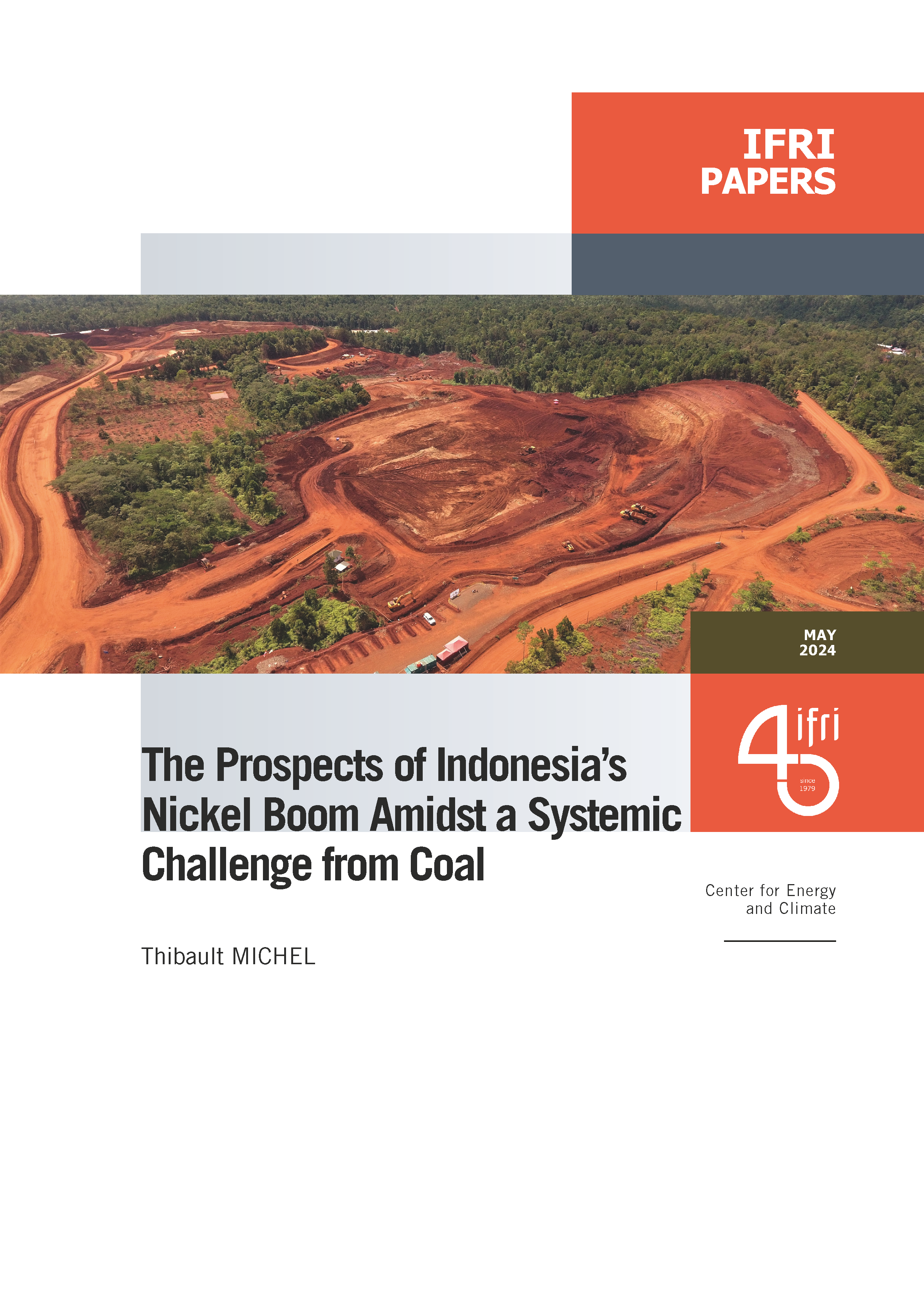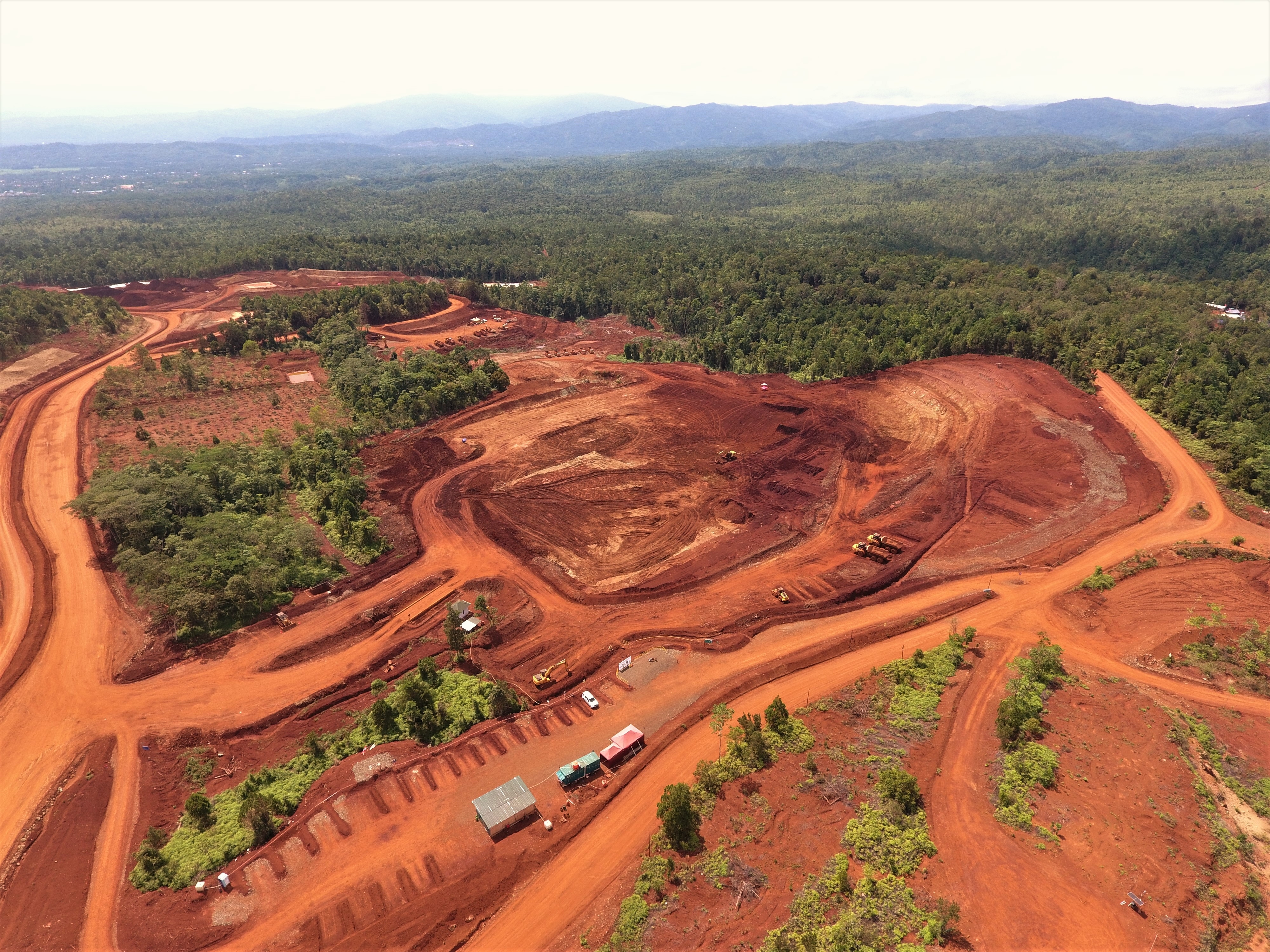The Prospects of Indonesia’s Nickel Boom Amidst a Systemic Challenge from Coal

Indonesia is a country that is booming economically and demographically. This not only matters for regional, political, and energy security, but also increasingly, for the world’s energy transitions, due to Indonesia’s large metal reserves, as well as its equally important coal consumption in industry and for power generation.
Over the last 20 years, Indonesia’s economy has been characterized by very dynamic growth, massive increases in its electricity demand, and coal consumption and exports. Hence, its greenhouse gas (GHG) emissions are on a steady growth trajectory, although the country has committed to lowering them by 32% (unconditional) or 41% (conditional) by 2030.
With its Organization for Economic Cooperation and Development (OECD) membership application, occurring in the context of global energy transition requirements and geopolitical confrontations, Indonesia is today at a crossroads.

Indonesia has 42% of the world’s nickel reserves, as well as substantial reserves of copper, gold, tin, and, notably, coal. This wealth in natural resources has given the mining industry crucial importance in Indonesia’s economic growth and has recently taken an even more prominent place: Indonesia has managed to become the world’s largest nickel producer within just a few years, as its share in global nickel extraction grew from 5% in 2015 to 50% in 2023. The country is also the world’s third copper ore exporter.
Coal and energy transition minerals have progressively replaced oil and gas in Indonesian exports. Between 2011 and 2023, oil and gas exports fell by nearly two-thirds and their share in the national exports decreased from 20% to 6%. In 2023, export revenues from copper were larger than those of oil and equal to gas earnings.
Yet, having major mineral deposits and mining activities is no longer considered sufficient by the Indonesian government. So far, the mineral industry’s growth has relied hugely on Chinese investments and on low-added-value activities, especially in pyrometallurgy processing. Diversification of trade partners and expansion into new, entire value chains is, therefore, a key objective for the Indonesian government.
Indonesia is seeking to boost trade with the United States (US), the European Union (EU) and even the Eurasian Economic Union. However, negotiations over respective agreements are currently encountering hurdles due to American legislation (the Inflation Reduction Act and Foreign Entities of Concern status), which could seriously threaten Indonesian exports of battery mineral components to the US market while they also face hurdles to entering the EU due to environmental regulations.
The second part of Indonesia’s strategy focuses on the development of new industrial segments of value chains: refining facilities, hydrometallurgical processing plants, battery factories, etc. To develop these activities, the Indonesian government is using two main tools: the divestment of foreign companies in local firms and export bans on crude ore exports. Such bans have been introduced for nickel in 2020 and for bauxite in 2023, while they are expected for copper in 2024 and perhaps even later for tin.
Indonesia is today also confronted with the negative repercussions of mining activities on its soil, including protests over the lack of safety in its mines and smelters, citizens’ expropriations, the presence of indigenous tribes on mining sites, and, above all, damage to the environment.
Such damage also has its roots in the substantial amounts of energy used to feed smelters, which mostly rely on the use of coal. Decarbonizing Indonesia’s economy has thus become a central challenge for the country, where the consequences of climate change are already palpable on the archipelago’s soil, with extreme weather events and the sinking of the capital city – Jakarta – as sea levels rise.
To carry out the tremendous transformation towards net-zero emissions while ensuring steady and sustainable development, the country has signed a Just Energy Transition Partnership and prepared decarbonization scenarios within this framework. Key priorities in the coming years include renewable energy deployment, grid development and an early phase-out of coal.
Deploying renewable energy sources as well as large and resilient grids is made more difficult by the country’s geography. The archipelago includes 17,000 islands, some of them being undeveloped, hard to access and far away from each other. Furthermore, the levelized costs of solar and wind power are currently high in Indonesia compared with other developing countries, while public subsidies for coal do not favor low carbon generation sources.
If the two first points are thus very challenging, the last one appears to be the hardest, considering the Indonesian economy’s tremendous dependency on coal. Concerns are therefore rising about Indonesia’s ability and even willingness to pursue a genuine, albeit differentiated decarbonization pathway.
There are also many questions regarding Indonesia’s mineral trade strategy. New bans on crude ore exports are expected to come into force, while new mining and mineral processing operations are under development across the archipelago, as quantities of nickel produced in the country are at historic highs.
This extraordinary increase in nickel production, concomitant with a global economic slowdown, has resulted in a sharp fall in nickel prices, with nickel losing half of its value between January 2023 and February 2024. As a result, many producers are finding themselves in danger, especially in Australia or New Caledonia.
While there could be a deliberate strategy to flood the markets and neutralize competition, notably by Chinese companies that control 75% of the global nickel supply (mainly from Indonesia but also from the Philippines), the country faces serious dilemmas. Indonesia’s oil and gas production is diminishing, and it increasingly relies on nickel exports and higher nickel prices for its economic stability, with coal also remaining very important. Indonesia’s resource nationalism and industrial strategy, which include attracting foreign investments, notably via its OECD membership pledge, require a credible pathway to reduce the carbon footprint of its electricity generation.
Among the pathways towards both decarbonization and the development of industrial battery value chains, three steps could be considered:
- Deploying renewable energy sources, especially solar photovoltaic (PV) power and offshore wind farms, as well as progressively transferring subsidies from coal to renewable energy sources.
- Developing a clean battery industry based on high environmental, social and governance (ESG) criteria and on the wealth of Indonesia’s subsoil, which includes most of the metals used in battery manufacturing.
- Protecting climate and biodiversity by favoring innovative solutions for mining waste management and upholding high ESG standards.

Available in:
Regions and themes
ISBN / ISSN
Share
Download the full analysis
This page contains only a summary of our work. If you would like to have access to all the information from our research on the subject, you can download the full version in PDF format.
The Prospects of Indonesia’s Nickel Boom Amidst a Systemic Challenge from Coal
Related centers and programs
Discover our other research centers and programsFind out more
Discover all our analysesAI, Data Centers and Energy Demand: Reassessing and Exploring the Trends
The information and communication technologies sector today accounts for 9% of global electricity consumption, data centers for 1-1.3%, and artificial intelligence (AI) for less than 0.2%. The growing energy demands of cloud services first, and now AI workloads (10% of today’s data centers electricity demand), have exacerbated this trend. In the future, hyperscale data centers will gain shares amongst all kinds of data centers and AI will probably account for around 20% of data centers electricity demand by 2030.
Unlocking India’s Energy Transition: Addressing Grid Flexibility Challenges and Solutions
India is rapidly scaling up its renewable energy (RE) capacity, adding 15–20 GW annually, but the ambitious goal of 500 GW of non-fossil capacity by 2030 is at risk unless the pace accelerates.
Europe’s Black Mass Evasion: From Black Box to Strategic Recycling
EV batteries recycling is a building block for boosting the European Union (EU)’s strategic autonomy in the field of critical raw minerals (CRM) value chains. Yet, recent evolutions in the European EV value chain, marked by cancellations or postponements of projects, are raising the alarm on the prospects of the battery recycling industry in Europe.

The New Geopolitics of Energy
Following the dramatic floods in Valencia, and as COP29 opens in Baku, climate change is forcing us to closely reexamine the pace—and the stumbling blocks—of the energy transition.












